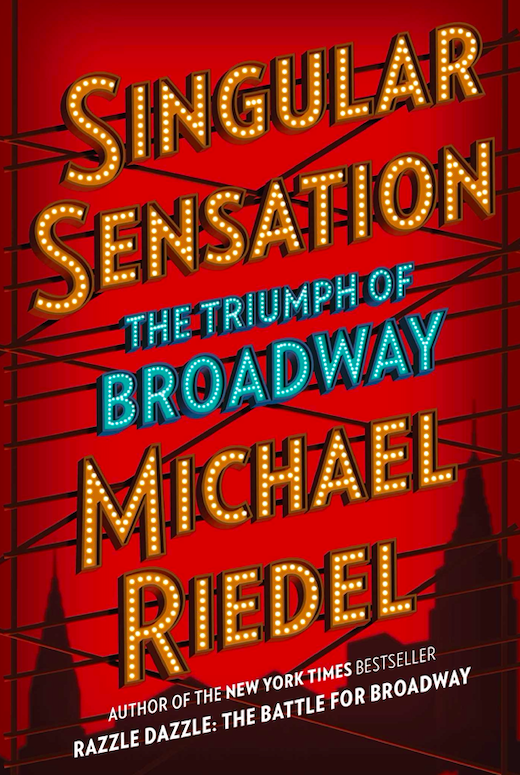REVIEW: ‘Singular Sensation’ goes behind-the-scenes of Broadway’s dominance in the 1990s
Photo: Michael Riedel’s new book is Singular Sensation. Photo courtesy of Annie Wermiel / Provided by Avid press site with permission.
Michael Riedel, the longtime columnist for the New York Post, has crafted an impressive career of providing insights and tantalizingly juicy bits about the New York theater scene. He’s a frequent presence in Broadway audiences (when the shows are running, of course), and he seems to have an endless Rolodex of contacts amongst producers, directors, writers and actors. He’s a go-to source for all things theater, and his new book, Singular Sensation: The Triumph of Broadway, focuses in on the dominance of the Great White Way in the 1990s.
This stellar tome, which lives up to its title, is an insider’s look at how Broadway beat the odds and gained in popularity after an uncertain period of financial difficulty. The book serves as a follow-up to Riedel’s well-received Razzle Dazzle: The Battle for Broadway, and no doubt there’s plenty of content available for a third in the series.
In the introduction to the new book, Riedel addresses the elephant in the room: COVID-19 has shut Broadway theaters for their longest hiatus in history. They shuttered in mid-March 2020 and will remain closed until at least June 2021. That gives Riedel’s book a special significance because he depicts events and individuals from an era that increasingly seems to be a bygone period, from a pre-coronavirus reality. And now this new datum point will bring theater into a different, and perhaps more volatile future. Kudos to the author for addressing the new and saddening reality of show business in 2020.
Riedel’s look back at the 1990s begins with a doozy: Andrew Lloyd Webber trying to replicate his success with Cats and The Phantom of the Opera. This time he centered his efforts on adapting Sunset Boulevard to the stage, and the author offers tasty anecdotes about the composer’s working relationships (or lack thereof) with Patti LuPone and Glenn Close. It’s an international story, with LuPone earning the Norma Desmond role in the original London cast, but Close winning favor in Los Angeles. Ultimately Close took the role to Broadway, with much drama in her wake.
Often when Riedel spins a yarn he focuses on the finances and critical reaction of a show. He quotes many reviews, including some of his own thoughts of being in the audience, and that means readers will get the chance to relive some morsels from Frank Rich, Ben Brantley and company.
Although stories about the back-and-forth between established stars are interesting, Singular Sensation finds its true heart when describing the ascendancy of newcomers to the upper-echelons of the theater world. Most movingly is Riedel’s take on Jonathan Larson and his game-changing musical Rent. The show, which was inspired by Larson’s and his friends’ personal lives, went through many developmental obstacles off-Broadway at the New York Theatre Workshop, but eventually the cast and crew realized they had a hit on their hands. Unfortunately Larson, eminently talented and no doubt heading for a long career, couldn’t enjoy the acclaim of his little-show-that-could. He died tragically during the early days of the off-Broadway run, but the show’s backers continued with his vision and dream, taking the property to Broadway for an award-winning, multi-year run.
It’s appreciated that Riedel also gives some ink to plays that graced the stages of Broadway — and even one that technically didn’t, but was much-heralded by critics and audiences: Edward Albee’s Three Tall Women, which ran for more than a year off-Broadway. This story is a fascinating read; to think of Albee having a a low period in his career is almost mind-boggling considering that his later years saw many new plays and appreciated revivals: The Goat, or Who Is Sylvia?, A Delicate Balance, two productions of Who’s Afraid of Virginia Woolf? and a recent take on Three Tall Women with Glenda Jackson, Laurie Metcalf and Alison Pill.
Throughout these 300 pages there are numerous shows mentioned, everything from Guys and Dolls to Chicago to Angels in America. Multiple chapters depict the saga of Toronto-based Garth Drabinsky, a newly renovated theater on 42nd Street and the much-beloved Ragtime. Some of the best writing — and the best stories that Riedel has to tell — are centered on Julie Taymor’s work on Disney’s The Lion King. What a Broadway-style narrative this one turns out to be, from its infancy as a cinematic idea, to bringing Tim Rice and Elton John together, to hiring the visionary Taymor, to opening and dominating on Broadway.
The book ends with a show that changed the musical comedy landscape: Mel Brooks’ The Producers starring Nathan Lane and Matthew Broderick. The development of the spectacle, with inside information from director-choreographer Susan Stroman, is certainly interesting, but the best bits are how the show and the entire theater community rebounded after the 9/11 terrorist attacks. The show went on, but in 2020, when that edict cannot be followed, the lessons learned prove quite poignant.
Singular Sensation is accessible to non-theater fans because it’s well-researched and any inside language is explained with easy-to-digest terms. In many ways, the book is a guidebook on how to produce (and not produce) a success on Broadway.
But for the dedicated fan of New York theater, this is a special treat, indeed. The book fills in the blanks on so many well-known properties, dishing details on names both known (stars) and unknown (producers). For those who love the breeze that blows through Shubert Alley, for those who have stage-doored their favorite musicals, for those who have waited for hours for rush tickets, for those who helped make Broadway a triumph, Singular Sensation is required reading and the book of the year.
By John Soltes / Publisher / John@HollywoodSoapbox.com
Singular Sensation: The Triumph of Broadway by Michael Riedel. Avid Reader Press. 352 pages. Click here for more information.


